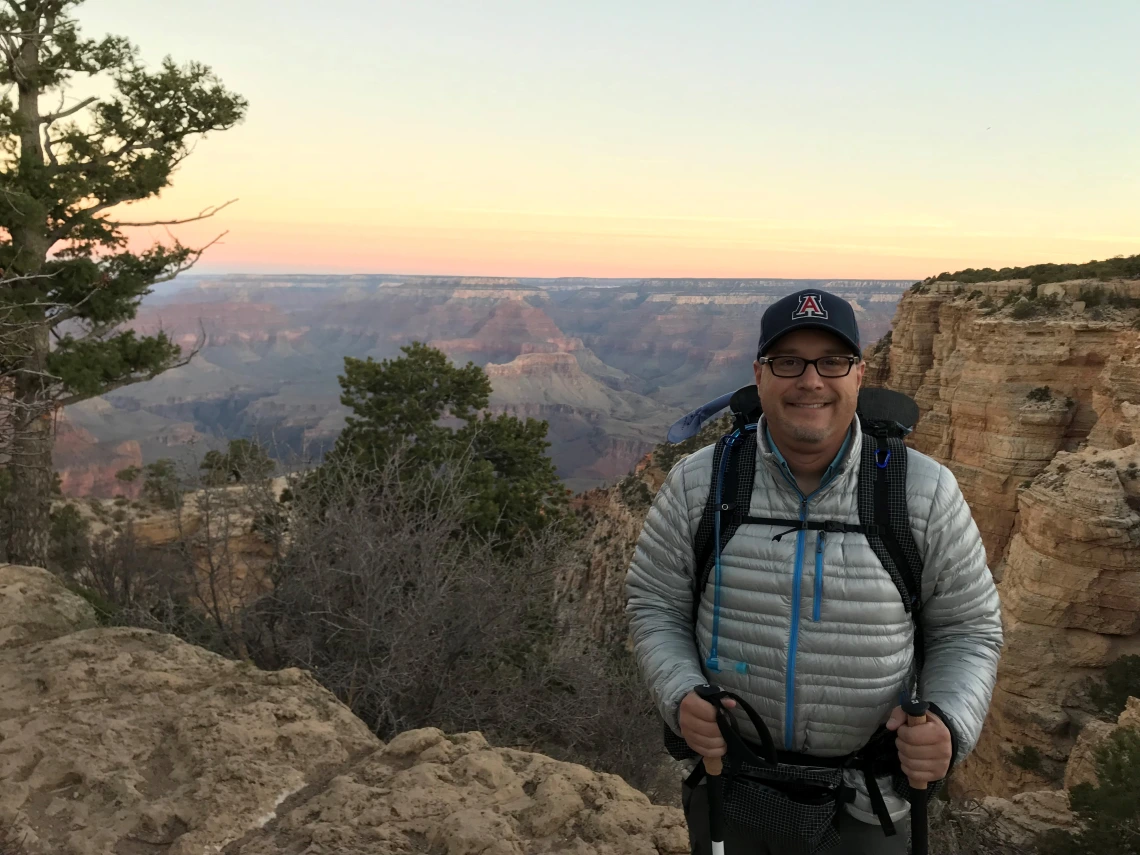Patient Profile: Christopher Smiley

photo taken by an unknown hiker, courtesy of Christopher Smiley.
Christopher Smiley was caught in the vortex of a cross-country move from Mississippi to Arizona when he found a patchy white sore on the bottom of his tongue. It was unusual, but he’d had sores in his mouth before, so he placed his worries on the mental backburner. Instead, he and his wife, both active-duty military for nearly two decades, concentrated on relocating their household and three children from the Deep South to the Southwest.
“Fast forward about six months,” Christopher recalls. “The lesion started growing. It was starting to cause some pain. I finally slowed down and realized it was time for me to get this thing looked at.”
A dentist was sufficiently alarmed to order a same-day biopsy — a move that shook Christopher out of his six-month state of denial. When the results came back, he had a diagnosis: squamous cell carcinoma.
The news was a shock. Before he knew it, he had seen a cadre of medical professionals, and his surgeon, Audrey Baker, MD, removed part of his tongue and 84 lymph nodes from his neck. Three of them came back positive for cancer, showing it had spread to his neck.
‘Someone has got to be the guinea pig’
Christopher’s new life in Tucson included regular visits to the University of Arizona Cancer Center. In addition to receiving chemotherapy and radiation, he enrolled in a clinical trial for an experimental immunotherapy treatment called IRX-2. Although many people would balk at taking an unapproved drug, its experimental nature didn’t faze him one bit.
“If we’re ever going to stumble upon a cure for cancer, someone has got to be the guinea pig,” he says. “Besides, I was already dealing with cancer. How much worse could it be?”
If IRX-2 worked as hoped, it would make his cancer less likely to return. The idea was immensely appealing to Christopher — even when he was told there was a 1-in-3 possibility of being placed in the control group, meaning he wouldn’t receive IRX-2.
“If there was a chance of it helping me, I wanted to be a part of that,” he recalls.
But Christopher soon discovered he had been assigned to the control group.
“I was slightly disappointed,” he admits. “But if I didn’t participate, that just prolongs finding out whether that drug is actually helpful.”
At the end of the day, Christopher knew his involvement helped push science forward, making a better world for tomorrow’s patients — and for his children.
“If I have to deal with cancer, that’s one thing, but the thought of my children having to deal with it really bothers me,” he says. “Medicine doesn’t just fall out of the sky. Without drug trials, we’re never going to cure cancer.”
‘Life is very precious’
Christopher’s diagnosis led to a shift in perspective.
“When you’re faced with this deadly disease, you quickly realize that life is very precious,” Christopher reflects. “I decided it was time to move forward with my goals.”
After years of toying with the idea of going back to school, he made the decision to enroll in the UA Eller College of Management.
“I started my MBA program a month and a half after treatment,” he says. “I still didn’t have hair growing on the back of my head.”
Christopher also started a blog, an outlet for his complex emotions that soon connected him to an eager support network.
“It started off with just friends and family,” he recalls. “After treatment was over, I had upward of 400 people who read every day.”
He also drew strength from his military training, especially his work as a resiliency instructor for the U.S. Air Force Noncommissioned Officer Academy. He taught his fellow airmen to cope with curveballs and chronic stress in a constructive way, helping them withstand hardships and recover from their aftershocks.
“Little did I know that those skills were going to become a huge factor in my own life,” he says. “Cancer can poison your mind if you allow it to. Resiliency plays a major role in someone’s treatment and ability to get through it.”
Now that Christopher is on the other side of his treatment, he is back to enjoying activities that have brought him joy throughout his life, such as basking in the magnificence of nature.
“I find beauty everywhere I go,” he says. “One of my goals in life is to hike the entire Pacific Crest Trail, from the border of Mexico to the border of Canada. I have that on my agenda for as soon as I retire from the military.”
For Christopher, the future is as wide open as a vista over a Western landscape.



